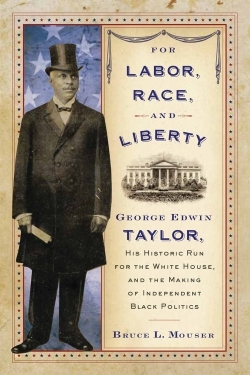For Labor, Race, and Liberty
George Edwin Taylor, His Historic Run for the White House, and the Making of Independent Black Politics
“The problem of the twentieth century is the problem of the color-line…,” was an especially memorable line written in 1903 by W.E.B. Du Bois in the The Souls of Black Folk, just one year before George Edwin Taylor became the first African American to run for President and barely forty years after the Emancipation Proclamation. Both Taylor and DuBois struggled mightily with the problem of the color line, albeit from different perspectives. For Labor, Race, and Liberty, by Bruce L. Mouser, professor emeritus of History at the University of Wisconsin-La Crosse, is an extraordinary sweeping biography of Taylor and an exposition of the development of independent Black politics at a crucial time in American history.
To say George Taylor was a remarkable man is an understatement. Born in 1857 in Arkansas to a slave father and free mother, George Taylor was raised a free man in rural and small town southwest Wisconsin, received a classical education at now defunct Wayland University, owned and operated several black labor newspapers, was prominent in national black fraternal organizations, and was the candidate of a black national party for President of the United States in 1904. Taylor’s accomplishments would have been outstanding for any man in this country but for an African American operating in the period of the formulation of segregation and the Jim Crow laws it is truly an exceptional story.
Mouser also gives a rich and detailed account of life on the midwest frontier of the late nineteenth and early twentieth centuries and a fascinating discussion of black America’s search for equality and identity. Blacks had been loyal to the Republican Party since the Civil War, but, Mouser notes, by the 1890s black leaders had begun to realize they had been abandoned by the party of Lincoln. The Civil War had ended slavery but blacks were shackled anew by industrial slavery.
As a political leader, George Taylor championed a pension plan for former slaves and, like Booker T. Washington, advanced a more gradual approach to black political and social advancement. Eventually he was overshadowed by W.E.B. Du Bois and other younger members of the emerging African American elite who argued for a more aggressive civil rights program using litigation, where necessary, to advance their cause.
George Edwin Taylor’s life may be, to some, a footnote in the history of African American politics. Mouser has made it, however, an enlightening footnote well worth reading.
Reviewed by
John Michael Senger
Disclosure: This article is not an endorsement, but a review. The publisher of this book provided free copies of the book to have their book reviewed by a professional reviewer. No fee was paid by the publisher for this review. Foreword Reviews only recommends books that we love. Foreword Magazine, Inc. is disclosing this in accordance with the Federal Trade Commission’s 16 CFR, Part 255.

